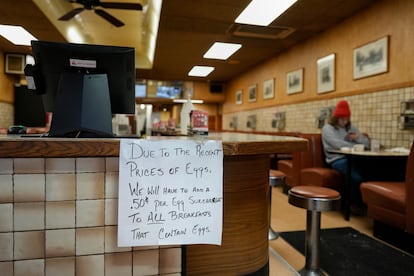US egg producers see profits soar as bird flu crisis rages
While the food item is scarce on supermarket shelves, investors have seen gains of up to 120% in a year. Across the country, 15% of the laying hen population has already been culled to contain the contagion


Laura Saade, 27, hasn’t bought eggs for two weeks. First, they became more expensive. And then, there were none available. The woman of Colombian origin — who shops at the Walmart at 200 Otis Street, in Northborough, Massachusetts — says that “a dozen [eggs] went up to $8.00.” She used to pay $4.00.
Demand in the country is soaring. The bird flu has resulted in 15% of the country’s laying hen population having already been slaughtered, according to the agri-food consultant Expana. This is further straining the balance between supply and demand in the U.S. In 2024, egg prices rose by 56%.
However, while consumers suffer from the increase in prices (and are being encouraged to change their eating habits), investors have found the goose that lays the golden eggs. Shares of Cal-Maine Foods — which sells one in 10 eggs in the U.S., making it the largest domestic producer — and Vital Farms, which focuses on raising free-range chickens, have seen their stock prices soar by 57.82% and 120% respectively in a year. The Chefs’ Warehouse, which supplies eggs to restaurants, has seen its stock price rise by 77% over the last 12 months.
In 2024, the three companies outperformed large meat producers such as Tyson Foods, or Brazil’s JBS. What’s more, they’ve achieved better performance than the S&P 500 (22.3%) and the Stoxx 600 (12.5%) over the same 12-month period. In an interview with Bloomberg, Pooran Sharmaan, an analyst at the financial services firm Stephens, noted that “what we’re seeing is how these companies are reaping the benefits of an increase in prices.”
Despite the sharp rise, analysts note that the firms still have room for growth: 72% of analysts consulted by Bloomberg recommend buying shares in Vital Farms. Among them, experts from the investment bank Jefferies set a projected price of $46 per share, which would imply a potential 25% increase compared to the current price ($35.4). Such a gamble is justified by the company’s growing profits. In the third-quarter of 2024, based on the latest figures released, Vital Farms increased its revenue by 31.3%, reaching $145 million. It also improved its end-of-year forecasts, to $600 million. The company’s goal is to reach a turnover of $1 billion by 2027.
Nicolás Gachancipá, another Colombian resident in New York City, also complains about the prices: “The cheapest dozen is $9.00. You’re better off eating at Chipotle,” he notes. Between December of 2024 and January of 2025, the price of eggs rose by more than 15%, according to the U.S. Bureau of Labor Statistics. This is the largest monthly increase since 2015. The category of poultry, fish and eggs rose by 1.9% in that period, but the latter accounted for “two-thirds of the total monthly increase in the household food index,” the report concludes. The rise in egg prices led to U.S. inflation rising to 3% in January… the first month under Donald Trump, who reached the White House with the mission of lowering prices from the first day of his mandate.
The lack of supply led to the price of eggs increasing by 10% from one week to the next: a record. On average, a dozen eggs fetch $7.34. Stores from New York to Chicago to Los Angeles have limited purchases to a carton or two per customer, while the Waffle House chain has added a $0.50 surcharge per egg consumed.
Andrew Harig, vice-president of the Food Industry Association, recently assured Bloomberg that “challenges in the supply chain could put additional pressure on food prices in the short-term.” Harig added that “the impact of wildfires out West, cold weather in the Midwest and the ongoing avian flu outbreak bear keeping an eye on in the months to come.” He also warned that it remains to be seen whether “possible tariffs will impact the price of food.”

An opportunity for new markets?
The shortage has opened a window of opportunity for the vegan food industry in the U.S., with the sale of ingredients such as green soybeans. The production of vegan eggs is growing strongly, so much so that companies such as Eat Just have seen their sales increase fivefold from January 2024 to January 2025. The firm’s product, JUST Egg, is available in supermarkets such as Whole Foods or Walmart. Eat Just has acknowledged that, in some of these chains, its sales have risen by up to 70% in recent weeks.
Other major players in the global food industry are considering entering the U.S. market. Brazilian meat giant JBS has just bought 50% of Latin America’s largest egg producer, Mantiqueira Brasil. This move has been interpreted as an incursion into the poultry market, with an eye toward the U.S. “We’re not ruling out any option,” acknowledged Márcio Utsch, the CEO of Mantiqueira Brasil, referring to the possibility of entering the U.S. market. The firm wants to produce free-range eggs in the U.S. This category currently represents 15% of all its sales in Brazil.
Since the start of the avian flu outbreak in 2022, more than 100 million laying hens have died or been culled in the U.S., according to statistics from the United Egg Producers association. This problem has led the Trump administration to announce the development of a plan to stop the spread of the virus and avoid a lack of supply. Bloomberg has called this matter “the next big test” for the Republican.
Sign up for our weekly newsletter to get more English-language news coverage from EL PAÍS USA Edition
Tu suscripción se está usando en otro dispositivo
¿Quieres añadir otro usuario a tu suscripción?
Si continúas leyendo en este dispositivo, no se podrá leer en el otro.
FlechaTu suscripción se está usando en otro dispositivo y solo puedes acceder a EL PAÍS desde un dispositivo a la vez.
Si quieres compartir tu cuenta, cambia tu suscripción a la modalidad Premium, así podrás añadir otro usuario. Cada uno accederá con su propia cuenta de email, lo que os permitirá personalizar vuestra experiencia en EL PAÍS.
¿Tienes una suscripción de empresa? Accede aquí para contratar más cuentas.
En el caso de no saber quién está usando tu cuenta, te recomendamos cambiar tu contraseña aquí.
Si decides continuar compartiendo tu cuenta, este mensaje se mostrará en tu dispositivo y en el de la otra persona que está usando tu cuenta de forma indefinida, afectando a tu experiencia de lectura. Puedes consultar aquí los términos y condiciones de la suscripción digital.








































